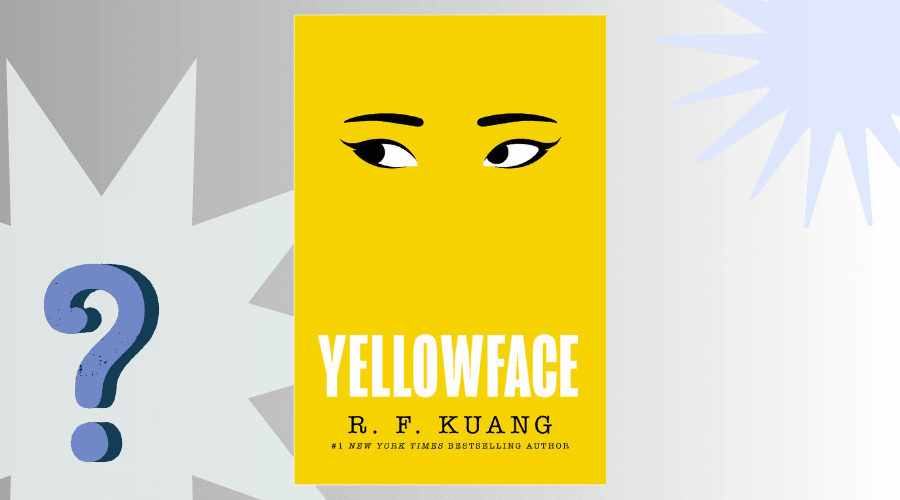Yellowface is an excellent choice for any book club, as there would be so much to discuss, all at the very least thought-provoking. The novel delves into cultural appropriation, privilege, and racism within the publishing industry-a subject of extreme relevance in modern conversations on diversity and representation. The story follows June Hayward, a white writer who steals the manuscript of her late Asian-American colleague, Athena Liu, and publishes it as her own. The morally ambiguous protagonist makes sure there’s much to discuss-whether the reader will sympathize with her or criticize every move she makes.
Its sharp, satirical tone keeps the novel moving along and allows readers to read the book smoothly-even for readers not used to heavy, serious literature. Meanwhile, it has the depth of level one would hope to find when seeking to tease apart themes and subtext in such a piece. The combination of humor and cuts against the creative world of individuals manages to entertain and also take up important subjects.
For book clubs, this novel invites lively discussions about identity, ethics, and the pressures of success. Plus, the story’s modern setting and fast pace make it a perfect pick for a group looking to connect literature to current cultural conversations. Add some creative flair to your meeting-debate how each of you would handle June’s dilemma or explore how your own club might respond to a similar scandal. It’s a guaranteed way to stir up both fun and meaningful dialogues.
20 Yellowface Book Club Questions
Here are 20 thoughtful Yellowface book club questions with sample answers to get your discussion rolling:
- What were your initial impressions of June Hayward as a narrator? Sample Answer: She’s unreliable, self-absorbed, and morally questionable, but that made her fascinating. Her vulnerability and constant need for validation added layers to her character.
- How did Athena Liu’s portrayal affect your understanding of the publishing industry? Sample Answer: Athena seemed almost untouchable—talented, privileged, and perfect—but her character also revealed the pressures placed on authors of color to perform a specific identity.
- Do you think June justified her actions, or was she fully aware of her wrongdoing? Sample Answer: She knew stealing was wrong, but she rationalized it by convincing herself she deserved recognition. Her self-delusion was key to her character arc.
- How does the title Yellowface reflect the themes of the book? Sample Answer: It’s a critique of cultural appropriation and the commodification of Asian identities in literature, tying directly to June’s actions.
- How does social media function as a character or force in the novel? Sample Answer: Social media is a driving force that fuels both June’s rise and fall. It shows how public perception can shift rapidly and the role of cancel culture.
- Were there any moments when you sympathized with June? Sample Answer: Her fear of obscurity and imposter syndrome was relatable, but her lack of accountability made her hard to root for.
- How does the book critique the publishing industry’s diversity efforts? Sample Answer: It shows how publishers tokenize authors of color while placing unrealistic expectations on them to embody their culture.
- What did you think of Athena’s portrayal—was she a victim, or did she also have flaws? Sample Answer: Athena was flawed, especially in how she treated June, but her death made her a symbol of systemic injustice.
- How did the novel’s pacing affect your reading experience? Sample Answer: The fast pace kept me hooked, mirroring the high-stakes nature of June’s actions and the publishing world.
- What role does guilt play in the novel? Sample Answer: Guilt is a constant undercurrent for June, but she suppresses it to avoid facing the consequences of her actions.
- How does Yellowface explore the concept of authorship and ownership? Sample Answer: It questions who has the right to tell certain stories and the ethical lines between inspiration and theft.
- Do you think Athena would have succeeded without her cultural identity being a focal point? Sample Answer: Probably not to the same extent, which is a commentary on how the industry packages authors of color.
- What does the book suggest about the relationship between art and morality? Sample Answer: It blurs the line, showing how ambition can override ethics in the pursuit of success.
- How did June’s interactions with the publishing industry shape her actions? Sample Answer: The industry’s obsession with marketability and trends pushed her to capitalize on Athena’s identity.
- How does Yellowface comment on cancel culture? Sample Answer: It critiques how quickly public opinion can shift and how online outrage can sometimes overshadow deeper issues.
- What impact did the flashbacks to June and Athena’s friendship have? Sample Answer: They added complexity, showing how envy and insecurity fueled June’s betrayal.
- How did the ending leave you feeling? Sample Answer: It was fitting—June is exposed, but the industry moves on, highlighting the cyclical nature of exploitation.
- Did you find any parts of the book particularly humorous or satirical? Sample Answer: June’s inner monologues about publishing clichés were darkly funny and spot-on.
- What role does race play in shaping the characters’ experiences? Sample Answer: Race dictates how Athena and June are perceived and treated by the industry and society, underscoring systemic bias.
- Would you recommend Yellowface to someone outside your book club? Why or why not? Sample Answer: Yes, it’s timely and thought-provoking, with themes that resonate beyond the publishing world. It’s also a gripping read that balances entertainment with serious commentary.
Yellowface: Discussion Topics
These expanded topics provide deeper insights into Yellowface’s themes, making for a rich and engaging book club discussion. Each one ties back to real-world issues, ensuring everyone has something meaningful to contribute.
Cultural Appropriation and Ownership of Stories
- Key Questions: Who has the right to tell a story? Is it ever acceptable to write from a perspective or experience that isn’t your own?
- This is one of the central themes of Yellowface. June’s theft of Athena’s manuscript raises questions about the ethics of storytelling and cultural ownership. The book critiques the way certain stories are commodified and how writers from marginalized groups are sometimes seen as “exotic” or “authentic” voices. Discuss how this reflects real-world debates about cultural appropriation in art and literature. Have you noticed similar controversies in the publishing industry or other creative fields?
Privilege and Systemic Racism in Publishing
- Key Questions: How does privilege manifest in June’s career versus Athena’s? Does the publishing industry genuinely value diversity, or is it more about optics?
- The novel explores how whiteness and privilege afford June opportunities that Athena, despite her talent, must fight to earn. At the same time, Athena faces the pressure of being pigeonholed into writing about her identity as an Asian-American woman. Discuss how the book critiques systemic bias in publishing and what it says about tokenism and performative allyship. How do June’s and Athena’s careers highlight the different challenges faced by authors of color?
Social Media and Public Perception
- Key Questions: What does the book reveal about the role of social media in shaping reputations? Is “cancel culture” effective or flawed?
- Social media is almost a character in itself in Yellowface, playing a significant role in June’s rise and fall. From its power to amplify voices to its tendency to fuel outrage, the book critiques both the positives and negatives of online discourse. Discuss the ways social media influences the publishing world and how it mirrors real-life examples of public figures being called out. Do you think June deserved the backlash she received, or was it blown out of proportion?
Morally Complex Characters
- Key Questions: Can you empathize with June’s feelings of insecurity and ambition? Do her flaws make her a better or worse character?
- June is a deeply flawed and unreliable narrator, which makes her both fascinating and frustrating. Her actions are often selfish, but her vulnerability and desperation for recognition may resonate with readers. Discuss how Kuang develops June’s character and whether she can be seen as a tragic figure or simply an opportunist. How do her choices reflect larger societal pressures around success and recognition?
The Pressure of Identity in the Creative World
- Key Questions: How does Athena’s identity as an Asian-American author shape her career? Are marginalized writers given the freedom to write beyond their lived experiences?
- Athena’s success is both a product of her identity and a burden. The novel critiques the publishing industry’s tendency to pigeonhole authors from marginalized backgrounds into telling stories solely about their identities, often at the expense of creative freedom. Discuss how this pressure affects Athena and compare it to the freedom June enjoys in taking on Athena’s voice. What does this reveal about the expectations placed on writers from underrepresented groups?
How to make Your Yellowface Book Club more Interactive?
Here are some creative ways to make your Yellowface book club discussion more interactive and engaging:
Host a Debate on Cultural Appropriation
- Activity: Divide the group into two sides. One argues that authors should have the freedom to write any story, regardless of their background. The other argues that only those with lived experience should write certain stories.
- Purpose: This structured debate allows members to explore different perspectives on one of the book’s central themes.
Analyze June’s Manuscript Choices
- Activity: Share a short passage from the book and ask members to rewrite it from June’s perspective versus Athena’s.
- Purpose: This exercise explores how voice, identity, and perspective influence storytelling. It also highlights the ethical implications of June’s theft.
Create a Mock Social Media Storm
- Activity: Assign roles (e.g., June, Athena’s fans, critics, publishers) and recreate the social media fallout from the book. Let members craft “tweets” or responses.
- Purpose: This immersive roleplay helps participants understand the pressures of public perception and cancel culture.
Explore Real-Life Parallels
- Activity: Research real-life controversies in publishing (e.g., accusations of cultural appropriation, cancel culture incidents). Compare these with the events in Yellowface.
- Purpose: Connecting fiction to reality makes the themes more tangible and sparks meaningful discussions about systemic issues in the creative world.
Authorial Ethics Workshop
- Activity: Break the group into smaller teams and give them hypothetical scenarios related to authorship ethics (e.g., “You’re inspired by a colleague’s work—how do you proceed?”).
- Purpose: This encourages critical thinking about morality, ownership, and creativity in writing.
Invite a Guest Speaker
- Activity: Bring in someone from the publishing world, such as a writer, editor, or diversity consultant, to discuss the book’s themes and their real-world relevance.
- Purpose: A professional perspective deepens understanding and adds authenticity to the discussion.
Discuss Book Reviews and Critical Reception
- Activity: Share reviews of Yellowface (both positive and critical) and discuss whether you agree or disagree with the critiques.
- Purpose: This helps members think critically about how literature is received and evaluated.
Showcase Asian-American Authors
- Activity: Spotlight works by real Asian-American authors and discuss how they tackle themes of identity and representation compared to Yellowface.
- Purpose: This expands the discussion to include voices and perspectives from the community being discussed in the book.
These ideas blend creativity, critical thinking, and hands-on participation to ensure your Yellowface book club is engaging, insightful, and memorable.

